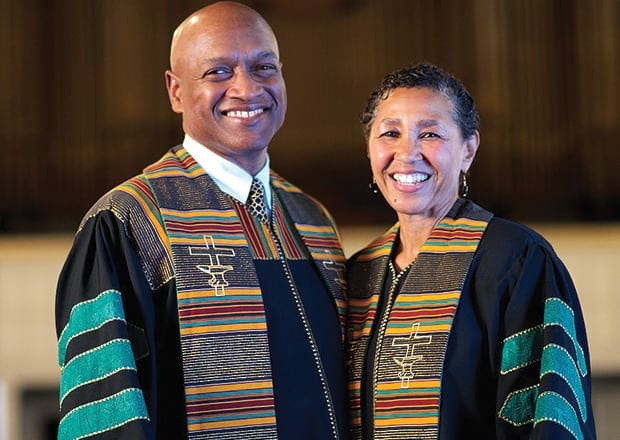
On September 26, 1923 Eva Butler was born in Surry, Virginia. Many things were in store for her. She became a school teacher, the mother of Rev. Dr. Ray Hammond. She also developed Alzheimer’s disease.
Eva proved to be an ambitious child with high aspirations. She was the first in her family to attend college. Her studies at Hampton University, however, were temporarily derailed by financial constraints. She was forced to move to Philadelphia to find work.
Her studies were further delayed when she met and married Raymond Hammond, a Baptist minister. The couple had three children, the oldest of whom is Rev. Dr. Ray Hammond, a pastor at Bethel AME Church in Boston.
Yet, even with two small children she returned to school and graduated from what is now Cheyney University. Eva could now add school teacher to her roles of wife and mother.
Rev. Dr. Gloria White-Hammond, wife of Rev. Ray, remembers her mother-in-law fondly. “She was funny, really tough and believed in order,” she said. “If she had been a white male she could have been a gazillionaire.”
Rev. Ray agrees and speaks of her compassion. He remembers she took a special interest in her school kids and provided emotional support as well as education. “Whatever she did, she went beyond what was required of her,” he explained.
Eva’s first signs of dementia were noticed but did not cause concern. “She was forgetting more than usual,” explained Rev. Ray, but attributed it to normal aging. She got lost a couple of times but when found she did not seem distressed.
Surprisingly it was a piece of furniture that tipped off Rev. Ray that something more serious was amiss. During a visit to his mother’s home in Philadelphia he noticed that the dining room table was cluttered with bills. “The dining room table was always clean,” he explained. He realized that his mother had lost the ability to organize her affairs — a stark difference from her typical behavior.
It was at that time the Hammonds had to face the realization that their mother was in all probability in the early stages of Alzheimer’s disease. “I didn’t want to think of it,” said Rev. Ray but an evaluation at Thomas Jefferson University Hospital confirmed their suspicions.
Oddly enough, despite her limitations, Eva was the caretaker of two relatives with Alzheimer’s disease. Because of a strong support system, including neighbors, her church and family, she could still manage independently. For about six months one of the Hammonds — including their two children — or other relatives and friends, visited Eva every two weeks. The visits were supplemented by frequent telephone calls.
Things were holding together, according to the Hammonds, until Eva’s neighbors noticed her sitting on her enclosed porch in her night clothes for long periods of time.
It was clear at that point that independent living was no longer an option. The relatives under Eva’s care were transferred to institutions. Eva herself was admitted to an assisted living program — a nightmare the Hammonds warned families not to repeat. The facility was not skilled in the management of people with dementia. Eva tried to escape and became belligerent. A second facility proved to be a godsend and in all probability saved her life. The thorough evaluation Eva received at the facility confirmed a diagnosis of colon cancer.
It was at that time the Hammonds brought her to live with them in Boston. Both pastors are also doctors and had the means to handle her cancer as well as her dementia. It was hard on Eva in the beginning. “I felt pain for her,” Rev. Ray explained. “She could see the differences [in herself].”
With medication, Eva’s condition was fairly stable, but caretaking took a toll on the family. Rev. Ray had to curtail his travel schedule. Trips to the gym by Rev. Gloria became rare. Both became sleep-deprived. They had to wake every three hours to prevent bed wetting, which is common among people with AD.
A lifesaver, according to Rev. Gloria was a six-week course run by a local organization, which offered advice on identifying doctors as well as sources of legal help and personal care.
The Hammonds offer recommendations. “Families need to take the time to talk about care,” they said. “Find a place experienced with treating AD and know what’s out there in terms of services.” If it’s too hard to handle emotionally, get help from a religious leader.
Eva died on December 18, 2009. The people who loved her remember her for who she was, not the disease that invaded her.
“Don’t fight over mama,” Rev. Ray said. “Take the time to plan who’s going to do what. It’s a long goodbye.”







